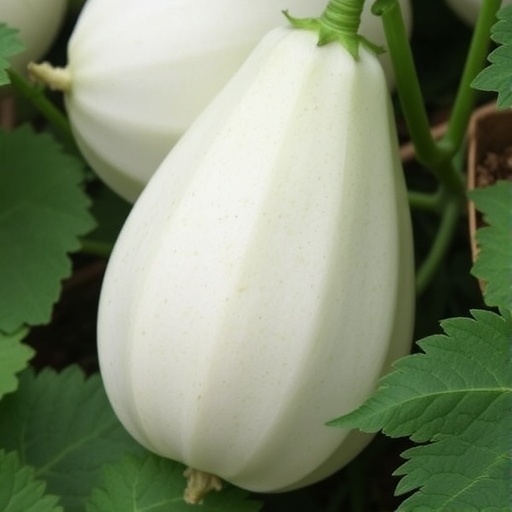In a groundbreaking study recently published in Discovery of Plants, researchers have turned their attention to the intriguing interaction between the Japanese weed melon and the notorious whitefly pest known as Bemisia tabaci, specifically the Middle East-Asia minor 1 (MEAM-1) biotype. This biotype has gained notoriety in agricultural circles due to its devastating effects on a range of crops globally. The article explores the potential of the Japanese weed melon as a natural deterrent against this pervasive insect, which has been synonymous with agricultural challenges for decades.
The significance of whiteflies in agriculture cannot be overstated. They are known vectors for several plant viruses, and their sap-sucking behavior not only weakens plants but can also lead to stunted growth and even death in severe infestations. Whiteflies reproduce quickly, making a single infestation problematic, as populations can balloon in a matter of weeks. With agriculture increasingly turning to sustainable practices, researchers are inspired to look for organic solutions that minimize the need for chemical pesticides.
The Japanese weed melon, scientifically recognized for its resilience, has piqued the interest of botanists and entomologists alike. It is an intriguing species that has evolved in an environment where competition and pest pressures are severe, leading to the development of unique biochemical pathways that may confer resistance against various pests, including Bemisia tabaci. Understanding these mechanisms provides not just insights into pest management but also highlights the potential of using native plants for biocontrol, which is a hot topic in sustainable agriculture.
This study undertook an evaluation of how effective the Japanese weed melon is against the MEAM-1 strain of Bemisia tabaci. Researchers employed a series of rigorous experiments to assess the plant’s efficacy in deterring whitefly presence. Initial findings were promising, suggesting that the melon emits specific volatile compounds that could disrupt the whitefly’s ability to locate suitable host plants. This form of chemical signaling is a sophisticated method through which plants can communicate their defense strategies within their ecosystems.
Moreover, the research highlights the potential use of the Japanese weed melon in integrated pest management (IPM) systems, where combining various control measures can lead to sustainable results. The researchers emphasized the importance of understanding the interaction between the plant’s natural defenses and the life cycle of Bemisia tabaci. By creating a holistic view of these interactions, agricultural scientists can design strategies that reduce dependency on chemical pesticides, thereby mitigating environmental impacts and promoting biodiversity.
The potential integration of the Japanese weed melon into agricultural systems presents a dual benefit: protecting crops from pest damage and enhancing the ecological footprint of farming practices. Studies indicated that incorporating this weed melon not only reduces whitefly populations but also enriches the soil and contributes to a more diverse plant community. Such practices foster resilience in ecosystems, allowing for more robust agricultural systems in the face of climate change and other environmental pressures.
The work further underscores the importance of traditional ecological knowledge, particularly from regions where the Japanese weed melon is cultivated. Farmers’ insights into the interactions of plants within their environments can provide invaluable information that complements laboratory research. By marrying empirical studies with local knowledge, the potential for successful pest management grows exponentially, demonstrating the necessity for interdisciplinary approaches to contemporary agricultural challenges.
As the agricultural community grapples with climate change and its myriad effects on pest dynamics, research findings like these spur critical conversations about sustainability. The efficacy of the Japanese weed melon could represent a paradigm shift in pest management methodologies. The findings offer hope not only for farmers battling whitefly but also for larger efforts to create sustainable agricultural systems that respect and utilize ecological balance.
In conclusion, Yamamoto-Kihara, Yoshioka, Tamura, and their team have opened new avenues of research by evaluating the Japanese weed melon’s potential against the MEAM-1 strain of the whitefly. Their work emphasizes the need to explore natural solutions in pest management while pushing for a broader understanding of plant-insect interactions. This study serves as a reminder of nature’s potential solutions to human challenges, advocating for a re-examination of often-overlooked weeds as powerful players in the agricultural landscape.
As researchers continue to explore the intricate relationships among plants, pests, and ecosystems, the future of sustainable agriculture looks promising. The Japanese weed melon stands out as a remarkable example of nature’s ingenuity, reminding us of the rich tapestry of biodiversity that supports our food systems. Such discoveries fuel the hope that with continued research, the agricultural community can foster resilient systems that not only feed the world but do so in harmony with the planet.
Subject of Research: Evaluation of Japanese weed melon against the whitefly Bemisia tabaci (Gennadius) Middle East-Asia minor 1 (MEAM-1).
Article Title: Evaluation of Japanese weed melon against the whitefly Bemisia tabaci (Gennadius) Middle East-Asia minor 1 (MEAM-1).
Article References:
Yamamoto-Kihara, M., Yoshioka, Y., Tamura, Y. et al. Evaluation of Japanese weed melon against the whitefly Bemisia tabaci (Gennadius) Middle East-Asia minor 1 (MEAM-1). Discov. Plants 2, 286 (2025). https://doi.org/10.1007/s44372-025-00373-3
Image Credits: AI Generated
DOI:
Keywords:




